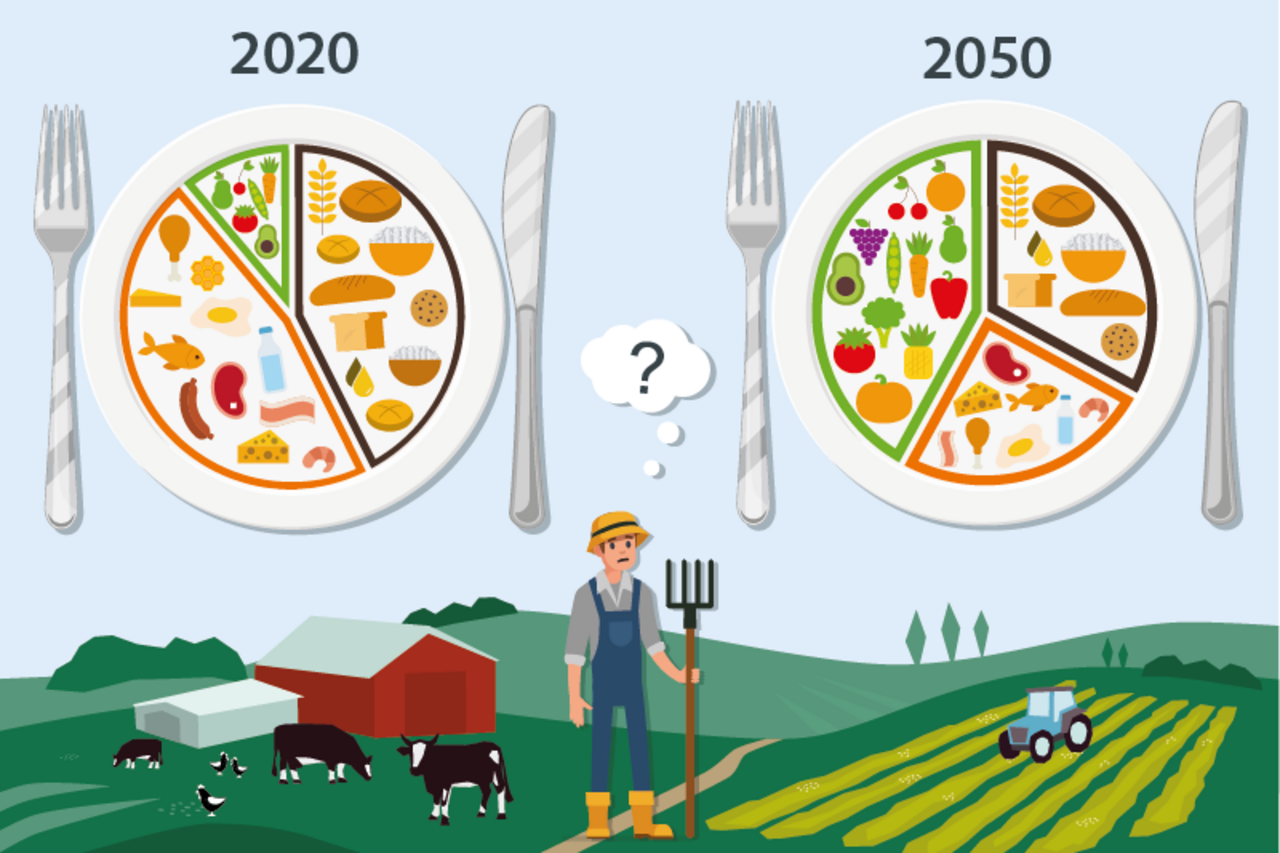Project
Changing Dietary Patterns

Impacts of changing dietary patterns on German agriculture
Vegans, vegetarians, flexitarians – an increasing number of people in Germany are consuming less animal-source foods. The impact analysis of these changing dietary patterns on the German agricultural sector forms the core of this project.
Background and Objective
Animal sourced foods are a major component of German diets, providing approximately 30 % of total daily calorie consumption and more than 60 % of daily protein intake (FAO 2020). However, demand for animal-based products is associated with adverse environmental and health impacts. Therefore, many consumers in Germany are questioning their dietary patterns, so that plant-based diets are becoming more popular. The individual adoption of plant-based diets is strongly influenced by certain socio-demographic factors such as age, gender and income, but on average statistics show that the consumption of meat, milk and dairy products in Germany decreased by 2.3 kg and 3.3 kg per capita respectively since 2010 (BZL 2019, 2020).
A more plant-based diet is also expected to have a significant impact on farmers, especially on those employed in the livestock sector. In Germany, one in two farms is keeping animals where livestock farming generates half of the total agricultural production value (BMEL 2019). This indicates that changing diets may not only affect consumers, but also have a complex impact on agricultural production and markets. Within this context, this project aims at determining and estimating the possible consequences of changing dietary patterns on the agricultural sector in Germany.
Approach
Changing dietary patterns have multiple impacts on the German agricultural sector, international trade and the environment. In order to estimate economic and ecological effects, we will conduct a model-based analysis using the general equilibrium model MAGNET (Modular Applied GeNeral Equilibrium Tool). The model depicts all sectors of an economy, with a specific focus on the agricultural sector and closely related sectors (e.g. biofuels). In addition, MAGNET considers domestic and international interactions between all actors and markets.
Within the project several scenarios will be implemented to analyse the effects of progressive reductions in the consumption of animal-source foods, the substitution possibilities of animal-source foods by plant-based products as well as the effects of demographic change on dietary patterns. Simulation results will show the effects on consumer spending, sectoral income, trade, welfare as well as on greenhouse gas emissions and resource use.
Our Research Questions
- How does a shift towards more plant-based diets influence the German agricultural sector?
- What effects can be expected from a decrease in animal-source food consumption on greenhouse gas emissions and resource use?
- How does demographic change affect dietary patterns and thus the agricultural sector?
- What impacts on agricultural trade would result from changing dietary patterns?
Thünen-Contact

Involved Thünen-Partners
Publications
- 0
Rieger J, Freund F, Offermann F, Geibel I, Gocht A (2023) From fork to farm: Impacts of more sustainable diets in the EU-27 on the agricultural sector. J Agric Econ 74(3):764-784, DOI:10.1111/1477-9552.12530
- 1
Freund F (2023) Marktplatz der Möglichkeiten : Pflanzliche Ersatzprodukte im deutschen Lebensmittelmarkt [online]. In: Grüne Ernährung : Vom Nachhaltigkeitswert pflanzlicher Lebensmittel für Umwelt, Wirtschaft und Gesellschaft. Bundesverband des Deutschen Lebensmittelhandels; Euromonitor International, pp 26-28, zu finden in <https://www.bvlh.net/presse/bvlh-foodnews/meldung/gruene-ernaehrung> [zitiert am 09.10.2023]
- 2
Geibel I, Freund F (2023) The effects of dietary changes in Europe on greenhouse gas emissions and agricultural incomes in Ireland and Denmark. Environ Res Lett 18(12):124026, DOI:10.1088/1748-9326/ad0681
- 3
Geibel I, Freund F, Banse M (2021) The impact of dietary changes on agriculture, trade, environment and health: A literature review [online]. German J Agric Econ 70(3):139-164, zu finden in <https://www.gjae-online.de/articles/the-impact-of-dietary-changes-on-agriculture-trade-environment-and-health-a-literature-review/> [zitiert am 16.08.2021], DOI:10.30430/70.2021.3.139-164

![[Translate to English:] [Translate to English:]](/media/_processed_/3/e/csm_AdobeStock_249730128_92f14d3a63.jpeg)
![[Translate to English:] [Translate to English:]](/media/_processed_/3/e/csm_AdobeStock_249730128_a6fcf4c893.jpeg)





